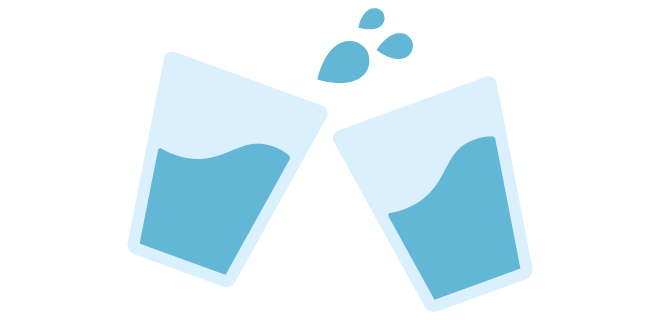What's going on with your water?
Find out what to do with your water when it smells or tastes different.
Musty and earthy taste and smells
If your water smells musty make sure your internal hot water pipes don't touch cold water pipes and that all plumbing valves, fittings and materials are WRAS approved.
Any sections of pipe or taps which aren't used often should be flushed through to allow fresh water in. This can be done by opening the tap and allowing the water to run for a few minutes.
Our Yorkshire Grid system means we can transport water around the region to meet demand. This can mean the source of your water and taste can change.

What causes musty and earthy tastes and smells?
Musty water that tastes or smells earthy can be caused by the growth of harmless micro-organisms such as bacteria and fungi in domestic pipework. It’s particularly common in sections that have a low usage or are subject to local warming, where hot pipes come into contact with cold pipes. Valves and fittings containing rubber materials are also particularly prone to these growths.
Sometimes, it is caused by very low amounts of naturally occurring substances released by algae growing in raw water reservoirs. These substances are not normally thought to be hazardous to health at the concentrations at which they are found. Our Water Treatment Works are operated to minimise these substances and we carry out daily checks on the smell of the raw and treated water.
Chlorine taste and smell
Our Yorkshire Grid system means we can transport water around the region to meet demand. This can mean that your chlorine concentration is not always the same, as the source and distance travelled may vary.
Yorkshire Water can’t promise your water will never taste or smell of chlorine and we know some customers are more sensitive to its taste.
- Fill a glass jug or bottle with tap water
- Cover it
- Leave it in the fridge for an hour or so
- We recommend using chilled water within 24 hours

What causes chlorine tastes and smells?
Why do we use chlorine?
By law we must disinfect all public water supplies. Most of the time we use chlorine based chemicals to ensure water is safe to drink and contains no organisms which could cause illness. We only add enough chlorine to disinfect, whilst minimising taste and smell.
How is it added?
Chlorine is continuously added at all of our Treatment Works which are monitored 24 hours a day at our central control room.
Why is chlorine more noticeable at certain times of the day?
The level of chlorine in water supplies can vary slightly depending on the distance the water has to travel through our pipes. Customers who live closer to the Treatment Works may notice higher levels of chlorine and water smells. At times of high demand, such as first thing in the morning and late afternoon, more people use water meaning the water travels to you more quickly and may contain more chlorine. With time, the concentration of chlorine in the water pipes reduces.
Bitter and metallic tastes and smells
Bitter and metallic tastes and smells are usually fixed by running the tap for 3 or 4 minutes to bring fresh water into your house.
Some people identify the taste of chlorine as metallic, particularly those who smoke. Have a look at our chlorine tastes and smells information.

What causes bitter and metallic tastes and smells?
What causes bitter tastes and smells?
A metallic or bitter taste in water is normally associated with increased concentrations of metals commonly found in domestic plumbing systems, such as copper or zinc. It can be due to water standing in that pipework for several hours or more and may be subject to local warming from unlagged hot water or central heating pipework.
This can be more noticeable in large buildings or in buildings with long lengths of pipework. Also, if you have a water storage tank, check what material it is made from and what condition it is in. Run your tap to draw fresh water in from the mains supply. You should notice a change in the water temperature when all the water has been cleared from your system.
Hard water
Water hardness can differ across our region as it depends on the soil and rocks from where your water is taken. For example, water that has been held in chalk or limestone will tend to be harder and is mainly found in the east of the region. On the other hand, water from moorlands tends to be softer and is mainly found in the west of the region.
Our Yorkshire Grid system means we can transport water around the region to meet demand. This can mean that your water hardness is not always the same as the source may vary.

Chemical taste and smells
A TCP or medicinal taste in the water is often caused by chemicals in kettles, rubber or plastic components of the domestic plumbing system reacting with chlorine in the water. While these chemicals are not usually harmful, they can taste unpleasant.
Fixing the problem
Kettles
If you only notice the taste in hot drinks, try boiling water in a clean saucepan. If the taste is no longer present, it’s likely because of the kettle gasket that seals the elements to the side of the kettle. This is often most noticeable with new kettles.
The problem may well go away with time if the kettle is new. Boiling fresh water each time may also help to keep the taste to a minimum. If the problem persists, you might like to contact the manufacturer for their advice.
Washing machines and dishwashers
Chemical tastes can be caused by the hose that feeds your dishwasher or washing machine. If the water pressure increases, the hose can blow up like a balloon. When the pressure is released, the hose collapses and can squirt water into your water supply pipe.
The water from the hose can then mix with your drinking water. To stop this, try shutting off the hose by turning off the water valve that feeds your dishwasher or washing machine when you're not using it.
If the valve is difficult to get to, you might want to get a plumber to move it or fit a check-valve so the water can't go back into your supply pipe.
We can send you a check-valve free of charge to fit at the start of the hose, this should stop your drinking water having a chemical taste.
Tap washers
Sometimes, the washer inside kitchen taps and stop-taps may be the cause of an unusual taste in your drinking water. This is more likely if it doesn’t conform to British or equivalent European standards. Water Regs UK can provide advice on correct tap fittings.
If there is a second mains fed tap in the house, try using water from this. If no taste is noticeable then the cause is probably the tap washer in the original tap. If no other suitable tap is available, run the tap for a short time before tasting the water. It’s worth noting that internal stop taps are also fitted with approved washers.
Other hoses and fittings
Many modern kitchen tap fittings use flexible or braided hoses and other rubber-like materials. Some of these fittings can create taste problems. The best way to eliminate these is to ensure that all your drinking water fittings are approved.
Products that are approved should be clearly labelled.
Please be aware, although it is against the Water Fittings Regulations to install any unapproved product to your drinking water pipe, it is not illegal to sell them and many unapproved plumbing products are freely available.
What causes chemical tastes and smells?
The chemical taste of your drinking water is likely to be caused by the rubber and plastic materials used in domestic appliances and fittings. These plastic fittings include kettle gaskets/seals, tap washers and hoses fitted to the inlet of washing machines and dishwashers.
The taste doesn’t come from the water pipes but is formed within properties. These plastic and rubber materials contain ‘phenols’ and related substances which can cause unpleasant tastes or odours. Additionally, low levels of chlorine may react with these chemicals to produce other taste-causing substances.
Although these substances can cause unpleasant tastes in hot drinks at very low levels (parts per trillion in some cases), they are not harmful to health at the levels normally detected.
Chemical taste issues can come and go due to one or a combination of the following factors:
- Changes in pressure - the pressure of your water supply is slightly higher at night and when fewer people are using water. This increased pressure can cause a slight expansion in the rubber hoses (like a long thin balloon) attached to washing machines and dishwashers. When a tap in your property is used, the pressure reduces and the expanded rubber pipe collapses and squirts water back into the incoming supply.
- Standing water - water left in your pipes overnight or when your property is empty is more likely to pick up any taste-causing substances from unapproved materials. Running your tap for a few minutes prior to use will solve this.
- Washer deterioration - certain types of washers degrade with time. Because the ‘break-up’ of these washers isn’t a continuous process, the taste may come and go.
Ensure all valves, fixtures and fittings are WRAS approved.
Petrol taste and smell
We’ll always investigate reports of petrol/diesel tastes and smells quickly to find the exact cause and offer advice on how to resolve it.
If you notice a petrol/diesel taste or smell to your water, please request a call back.

Seen a fuel spill?
If you know of any fuel spills in your area you should contact the environmental health team at your local council as soon as possible to try and prevent any further damage. Even if the water hasn’t been affected yet, it can still become contaminated through the plastic pipe in the future.
What causes petrol or diesel tastes and smells?
These one-off smells can be caused by a spillage of fuel or heating oil near a plastic supply pipe. Such substances can, over time, pass through the plastic pipes and result in changes to taste or smell. If the land is contaminated (such as from a fuel spill) then any underground plastic water pipes may need to be replaced in a protected material, e.g. plastic coated copper pipe or special plastic barrier pipe.
We will investigate whether your service pipe and our water mains are affected and advise if your service pipe needs replacing in a protected material.

